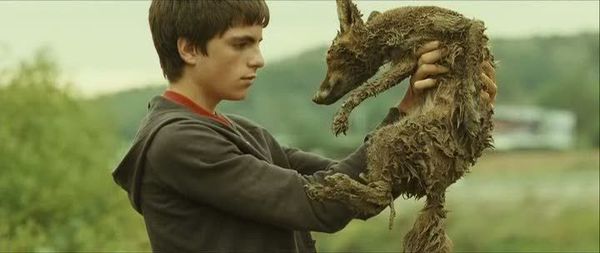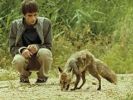Eye For Film >> Movies >> Little Indi (2009) Film Review
Little Indi
Reviewed by: Rebecca Naughten

Melancholy but not miserable, Little Indi (Petit Indi) walks the well-worn path of social realist cinema featuring marginalised kids who find solace in animals and the natural world. Arnau (Marc Soto) lives with his sister Sole (Eulàlia Ramon) and brother Sergi (Eduardo Noriega) while their mother is on remand in prison, and spends most of his time either alone in the surrounding countryside or training songbirds in an allotment shed.
But the Saul Bass-inspired opening credits and the slinky, percussion-heavy score that recurs throughout the film are an indication that director Marc Recha is aiming for something other than the drab miserablism associated with dramas set on the fringes of society. Recha depicts a hardscrabble existence but finds fleeting moments of beauty, affection, and pleasure by focussing on the things that truly matter to Arnau.

Arnau believes that the only way to help his mother - who is being kept in isolation and isn't allowed visitors - is to find the money for a lawyer. But despite Sole, her partner (Pere Subirana), and Arnau himself all holding down a variety of jobs, the family's financial situation is precarious. When Arnau's pride and joy - a goldfinch - wins a championship, a stranger (a cameo by director Agustí Villaronga) asks to buy the bird but Arnau isn't ready to give up the one thing that is truly 'his'. An alternative way of raising funds presents itself in the form of his uncle Ramón (Sergi López), whose income derives from betting at the dog track. This is unknown terrain for Arnau, who will discover that predators don't only walk on four legs.
The film takes place on the outskirts of Barcelona, but this is the city as it rarely appears on film - far away from the tourist spots and without a glimpse of Gaudí to be seen. This is the periphery where city meets country, a space of pylons, wire fences, and concrete embankments, where 'development' is ever encroaching but without a constructive impact on the lives of those in the vicinity - diggers loom in the background throughout the film, and the family is being pushed to uproot themselves and move to another suburb. Arnau walks for miles in these spaces - his shoes worn into holes in an intimation that other modes of transport are not an option - but never seems to arrive anywhere.
Arnau is at the centre of this peripheral world - and the affectionate family unit - and Marc Soto carries the film with aplomb. He gives a deftly-calibrated performance of introverted shyness - there's not a hint of surliness about him - as the thoughtful teenager who keeps too much to himself. Arnau is a young man of few words - we see a smile of quiet pleasure as he watches his bird perform, and the delight and amusement that flash in his eyes when his brother arrives home unexpectedly - but he never gives his emotions verbal expression or outlines his plans to his family. Soto's stillness is used to great effect in his interactions both with the birds - especially in the lovely sequence where the goldfinch flits about his head while he cleans out its cage - and the fox.
The fox represents the dangerous side of the natural world. From the instant that Arnau finds an injured and extremely mangy fox on the riverbank and gently carries it home, we know how this story must end - nature will out and devastation will be wrought. But rather than fall into predictability, Recha utilises our expectations to pull the tension ever tighter as the inexorable outcome of a wily, though seemingly tame, predator in proximity to the delicate beauty of tiny birds hovers just out of sight as we follow Arnau's preoccupation with helping his mother.
At the point when predators of a human variety have pushed Arnau into a corner, with dire consequences looming for his family, Little Indi reaches a denouement that is genuinely upsetting. This not least because events cause Arnau's gentle gaze to harden, and Recha refuses to give us the false comfort of a hopeful ending that would give lie to the circumstances in which his protagonist lives - and the film lingers in the mind all the longer because of it.
Reviewed on: 15 May 2014














